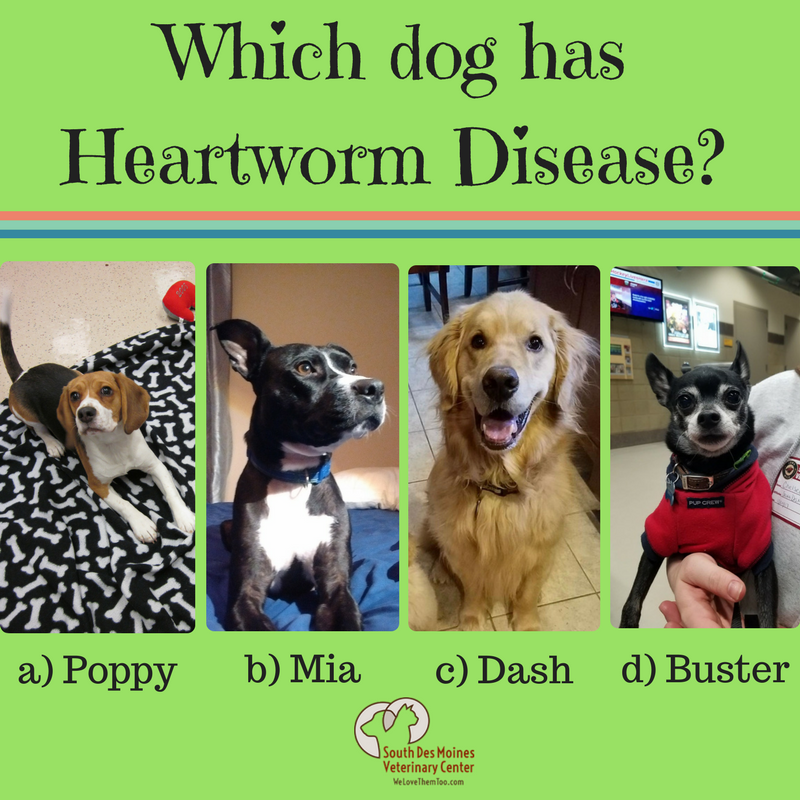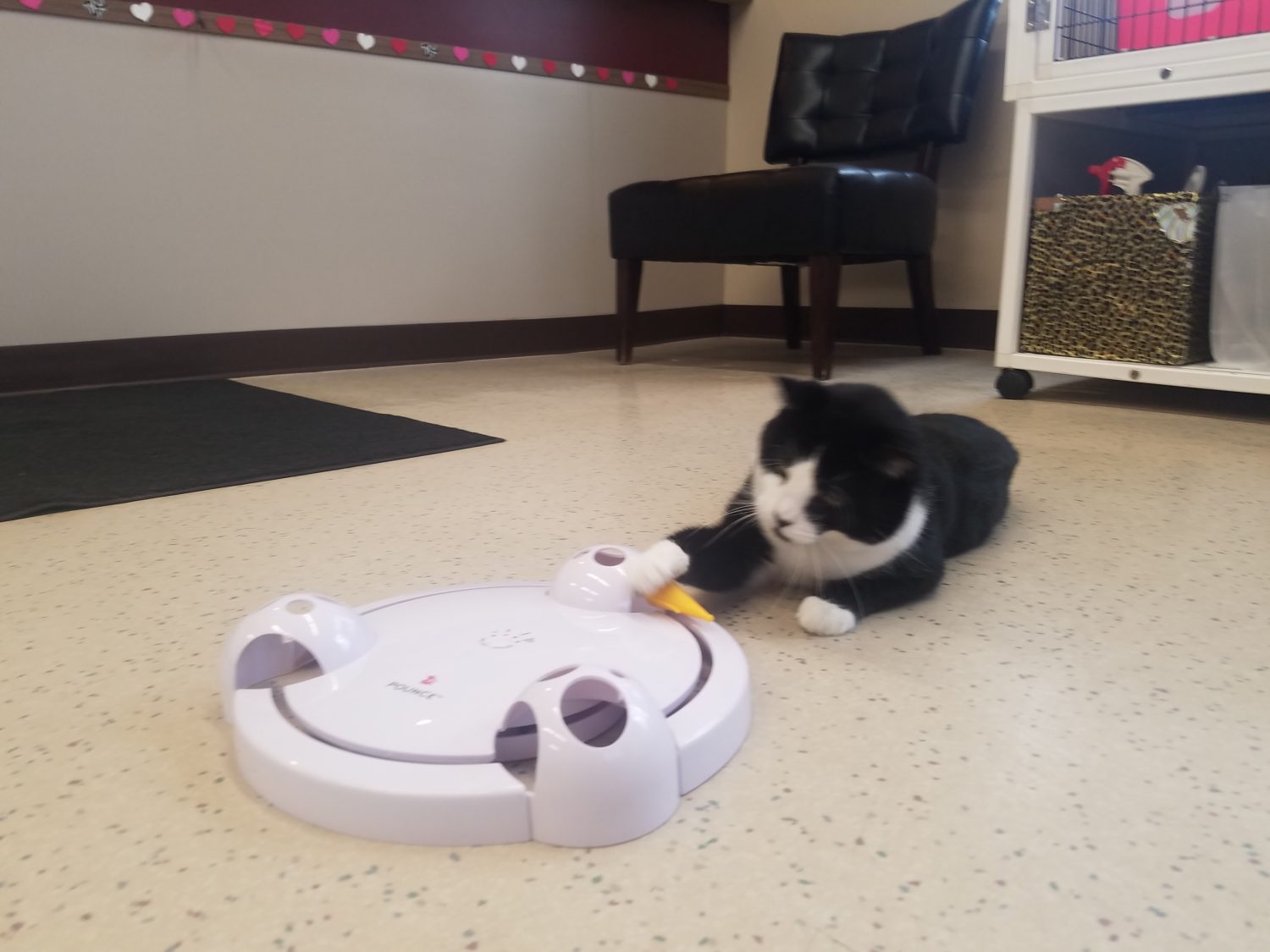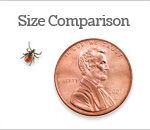Our Blog
Microchip Your Pet: It Can Save Their Life
Is Your Pet Microchipped?
If the answer is “no” or “I am not sure”, now is the time to connect with us.

What Is A Microchip?
A microchip is a permanent form of identifcation for your pet. It is approximately the size of a grain of rice and is administered between your pet’s shoulder plades.
How Does It Work?
We never expect our kitty to sneak out the door as the kids are racing in and out of the house. We never expect our pooch to bolt when the fireworks go off. But it happens. If your furry family member gets out and is scooped up by animal control or brought into a vet clinic, they will scan him for a microchip. The microchip contains a unique identification code. This ID code is linked to your information. This allows you to be reunited with your pet fast!
Why Should I Have My Pet Microchipped?
One out of three pets will go missing in their lifetime. That’s scary. If your pet is microchipped, it increases the chances of being reunited by over 90%.
Do you know which day pets go missing the most? The 4th of July. That’s less than a month away.
I Want To Get My Pet Microchipped, What Now?
Set up an appointment with us and we can implant the chip. The cost of having the microchip implanted is $49.35.
To have the microchip registered, it typically costs $19.99. This month, we are covering the cost of registration for you!
Spring Forward With Healthy Pets!

Along with an annual exam, wellness bloodwork provides insight to what is going on inside your pet.
Testing can reveal:
- Infection
- Liver disease
- Renal/kidney disease
- Diabetes
- Dehydration
- Thyroid abnormalities
Dogs and cats over the age of 8 have the greatest benefits to receiving this bloodwork. Many times pets appear normal upon physical examination, and their abnormalities on the inside go undetected without bloodwork.
The process of disease development in pets can be slow. When an organ system starts to fail, that organ will compensate to bring function back to normal. Overtime, this compensation mechanism will fail as well, and the pet will become ill. Once the pet is in organ failure, treatment options are limited and prognosis is poor.
The good news is if caught early, three out of four pets have abnormalities that can be treated! Bloodwork is collected in the clinic and sent out to our lab. Results come back in 1-2 business days. During the month of April we are offering $15 off wellness bloodwork for our patients.
Which Dog Has Heartworm Disease?
If left untreated, heartworm disease is fatal.
It takes approximately 6 months for a dog to test positive for heartworm after being bitten by an infected mosquito. Many times dogs do not show symptoms of the disease until it has progressed to the later stages.
This is why bringing your pooch to the vet for an annual heartworm screening is so important. Once the test is completed, you can begin a monthly heartworm preventive like Heartgard Plus, a beef-flavored chew, which protects your pet against this deadly disease. Currently, we are offering a $12 rebate on 12 months of Heartgard. Take advantage of this deal while it lasts!

Poppy, Mia, Dash & Buster are all patients at South Des Moines Veterinary Center. One dog tested positive and has been treated for Heartworm Disease. Can you tell which dog is positive? The signs are not always clear from just their appearance. Protect your pet from Heartworm Disease. Once a month, every month.
Want to protect your furry kiddos from Heartworm Disease? Set up an appointment here.
Three Weird Cat Behaviors Explained
Our feline friends are wonderful companions, but they can also be curious critters when it comes to some of their behaviors. Here are three weird cat behaviors explained.
My Cat “Head Butts” Me.
 Does your kitty rub his face on you? This is also known as “head butting” Don’t worry, this is a good thing! This is his way of saying “hello, you are my people and I trust you”.
Does your kitty rub his face on you? This is also known as “head butting” Don’t worry, this is a good thing! This is his way of saying “hello, you are my people and I trust you”.
Cats have scent markers in their cheeks and they are rubbing their pheromones on you when they “head butt” you. This is just one of the many ways cats show their love for their humans.
My Cat Loves to Sit in Small Spaces.
 If you’ve visited our office, you have probably met our charismatic clinic cat “Wesley”. He is notorious for curling up in the recycle basket behind the front counter that is approximately one size too small to fit (what we would consider) Wesley comfortably. However, with all his soft, plush beds scattered throughout the clinic, he still prefers to curl up in the basket. So why does he prefer the small space?
If you’ve visited our office, you have probably met our charismatic clinic cat “Wesley”. He is notorious for curling up in the recycle basket behind the front counter that is approximately one size too small to fit (what we would consider) Wesley comfortably. However, with all his soft, plush beds scattered throughout the clinic, he still prefers to curl up in the basket. So why does he prefer the small space?
Small spaces actually help cats feel more safe and secure. This stems to when cats are in the wild, they aren’t going to take a nap in a big open space, are they? No, they are going to hide in an enclosed spot where they are hidden from any potential predators. So, when they curl up in a box or hide in a small space, it means they are finding themselves a safe, secure spot.
My Cat Sleeps All Day and Keeps Me Up All Night.

There’s nothing worse than when you are laying in bed at night just about to drift off to sleep and your cat decides to tear through the house like he’s chasing a ghost. Cats need exercise and stimulation throughout the day to ensure a restful sleep at night. Consider a cat food puzzle toy to make eating more of a game or challenge. Interactive toys, like a laser pointer or a Pounce toy are great ways to stimulate your cats body and mind. It’s easy to think a cat is a “self-sufficient” pet, but they want companionship from their human friends just as much as we do!
4 Ways to Keep Your Dog’s Joints Healthy
 It may only be November, but the cold weather has made an early appearance this year. With the blowing snow and frigid temperatures, it’s easy for us to fall into a routine of warming up under a blanket by the fire or reading a book with a cup of coffee. Many times, our pets don’t want to go outside any more than we do. When we become sedentary, it can be harsh on our joints. This is also true for our pets. Just like our doctor encourages us to get exercise and take vitamins, there are several things you can do to keep your pet’s joints healthy as well.
It may only be November, but the cold weather has made an early appearance this year. With the blowing snow and frigid temperatures, it’s easy for us to fall into a routine of warming up under a blanket by the fire or reading a book with a cup of coffee. Many times, our pets don’t want to go outside any more than we do. When we become sedentary, it can be harsh on our joints. This is also true for our pets. Just like our doctor encourages us to get exercise and take vitamins, there are several things you can do to keep your pet’s joints healthy as well.
1. Exercise. Take advantage of those warm, sunny days when they are here by taking your dog for a short walk. Keep your dog active
indoors with interactive games. Try hiding treats throughout the house and encourage him to sniff out the treats. Play fetch or tug if you have a room big enough. Doggy daycare is another good way to get them exercise and stimulation with other dogs.
2. Synovi G4: This is a chewable supplement filled with glucosamine, turmeric and antioxidants to help keep your pet’s joints healthy. It’s as easy as giving him a treat! We carry these supplements in the clinic and are easily purchased with a prescription at SDMVC.
easily purchased with a prescription at SDMVC.
3. Acupuncture: This can help with a variety of health problems in pets. Acupuncture is performed by the insertion of fine needles into specific points on the body to stimulate specific points on the body. It can be very beneficial for dogs that have joint pain. We offer acupuncture at South Des Moines Veterinary Center with Dr. Franck.
4. Therapeutics: We have a wide variety of prescription medications that can help your dog’s joints if needed from anti-inflammatory medications to pain medications.
If you would like to discuss your pet’s joint health care, set up an appointment today!
April 26th is National Kids and Pets Day!
 National Kids and Pets Day is a fun day to celebrate the special bond that is held between our pets and kids. It also reminds us what pets can teach our children as they grow up.
National Kids and Pets Day is a fun day to celebrate the special bond that is held between our pets and kids. It also reminds us what pets can teach our children as they grow up.
RESPONSIBILITY: If your child is old enough to get involved with activities taking care of your pet, let her help! She can fill the water bowl, brush the fur, or help pick up the pet toys. As she grows older, she can assist with the feeding schedule, clean up feces from the yard, and even help with training.
COMPASSION: The compassion and nurturing that a child can learn from a pet will extend to other people as they grow, and even to their own kids one day.
HEALTH: In a world where technology is king, having pets can be a positive distraction from our devices. It’s also a great way to encourage the kids to get outside more!
SOCIAL: A pet can help teach a child social skills and build their confidence. Is your child learning how to read? Have her read a story to the cat! What’s better than having a best friend to talk to who will never judge you?
SAFETY: A pet helps teach our kids how to be safe with animals. As parents, it’s our responsibility to teach our kids how to interact with animals appropriately and always supervise their interactions. If you meet a new dog on a walk, does your child know to ask permission first before petting?
Thinking about adding a furry companion to your family? Consider adoption first.
Spring Safety Tips for Dogs and Cats
Spring has arrived in Iowa! With the warmer weather comes flowers blooming, spring cleaning and lots of rain! This means there are potential springtime hazards for your furry companions.
Easter
When spring arrives, we know that Easter is not far behind. With Easter comes lilies and candy, items that are very toxic to pets. If ingested lilies can be fatal to our feline friends, even with just a few bites. Chocolate goodies are also toxic to both dogs and cats. The plastic grass in Easter baskets can also cause an obstructed digestive track, causing severe vomiting and dehydration. If you suspect your pet has ingested any of these items, it’s time to visit your Veterinarian.
be fatal to our feline friends, even with just a few bites. Chocolate goodies are also toxic to both dogs and cats. The plastic grass in Easter baskets can also cause an obstructed digestive track, causing severe vomiting and dehydration. If you suspect your pet has ingested any of these items, it’s time to visit your Veterinarian.
Rain and Puddles
The rainy and wet season increases the risk of your dog contracting Leptospirosis, a bacterial disease that is spread by wild anim als. Leptospirosis (lepto) can cause liver and kidney damage. It is also zoonotic, meaning we (humans) can also contract lepto. We carry a vaccine that protects your pooch against the 4 most common strains of lepto. 
Screens
When the weather starts to get warm, we open the windows to welcome the breeze in. Our felines love to lounge in the window sill. Double check to make sure your screens are secure to prevent your cats from falling or jumping out.
Spring Cleaning
Keep those house cleaners and fertilizers away from your pets. Almost all cleaning products contain chemicals that may be harmful to our pets. Store your fertilizers, insecticides and herbicides out of reach of your pets. Follow the instructions on the label carefully to ensure your pet’s safety.
Allergies
Spring can be a prime allergy time for pets just like us. Pets typically express allergies through their skin. If your pet is itchy, biting at his feet or skin seems irritated, there are many things we can do to help them feel more at ease.
Fleas, Ticks and Mosquitoes, Oh My!
With Iowa weather, we see this pesky critters throughout the year and recommend preventive all 12 months of the years for both dogs and cats. If your pet is not on parasite prevention, now is the time to start!
To set up an appointment to see the doctor, click here.
You can also contact Pet Poison Helpline for immediate assistance.
3 Pet Safety Tips For Thanksgiving
1. IDENTIFICATION CHECK. Does your pet have a collar and tags with updated info? If your pet is microchipped, have you updated your contact information in the past year? The holidays bring an increase of pets who will sneak out the door unexpectedly and end up in a shelter. If you have guests visiting your home for the holiday or if you are leaving your pet with a sitter, this is an important step to ensure the safety of your pet.

2. SAFE SPACE. Whether guests are coming to your home or you are traveling with your pet, make sure your pet has a safe space away from the activities. This could be a crate or a guest bedroom. Set up your pet with water, a blanket and a favorite toy to help him/her feel more at ease.
3. FOODS TO AVOID. Many foods that are perfectly safe for humans, can be extremely toxic to pets. It’s best to keep them on their regular diet to prevent any illness. Here are some people foods that should be avoided at all costs:
- Fatty Foods. Meat drippings or scraps even in small amounts can cause a life-threatening condition in pets known as pancreatitis. Pancreatitis is an inflammation of the pancreas that can result in a trip the veterinarian. Clinical symptoms of pancreatitis are vomiting, diarrhea, loss of appetite and abdominal pain.
- Desserts. Most desserts contain chocolate which is well-known by most to be toxic to dogs. Remember the darker the chocolate, the more serious the ingestion. Many desserts and candies may also contain an artificial sweetener called xylitol. This is dangerous to pets. It can cause a rapid drop in blood sugar along with liver damage.
- Raisins/Grapes. These can be found in some of our Thanksgiving favorites and can cause acute renal failure even in small amounts.
- Bones. Turkey or ham bones can cause obstructions if eaten, as well as, can make your pet’s tummy upset. It’s best to get a pet- safe bone or goodie for them to enjoy for the holiday.
Lyme Disease: Is Your Dog At Risk?

Fall is the season for football, pumpkin spice lattes, sweaters, boots and ticks.
Wait, TICKS?
Yes, ticks! Iowa provides two ideal situations for ticks: cool weather and a high deer population.
So how do you know if your pet is at risk for Lyme disease? Here are some risk assessment questions:
- Have you ever found a tick on your pet? On yourself or a member of your household?
- Does your dog live in a suburban home next to wildlife areas?
- Is your dog’s yard surrounded by tall brush or grass?
- Does your dog go walking, hiking, picnicking, fishing or camping in wooded areas?
- Does your dog frequent areas with lots of deer?
If you answered yes to any of these questions, talk to your veterinarian about Lyme disease. You can also check out this prevalence map to see what tick-borne diseases you should be concerned about in your area.

The deer tick is very hard to spot on dogs.
Lyme disease is a growing concern because the disease is increasing in number and expanding geographically. It is a potentially serious illness transmitted to dogs by the deer tick. Symptoms of Lyme disease in dogs are:
- Lameness
- Not eating
- Fever
- Stiffness
- Joint Pain/Swelling
- Depression
Lyme disease in dogs is largely preventable by using a tick preventive and an annual Lyme vaccine.
Itchy Pet? We Can Help!

Has your dog or cat been itchy and uncomfortable lately?
Pets can display these symptoms any time of the year, but we tend to see an increase during this time of the year. Thankfully, there are many things we can do as pet owners to help our pets find relief!
First things first: Are all pets in the home protected against fleas?
Even if your pets are 100% indoors, they all need to be protected. We can carry fleas in just as easy as they can pick up fleas outdoors. The cooler weather should not be an indicator that it’s okay to stop a preventive. The fleas are still out in full force and ticks actually thrive in the 50-60 degree weather so tick protection is important as well during this time of the year. Click here for more info on flea and tick symptoms and preventive care. If you see any of these symptoms, please contact your veterinarian.
Allergies: Pets can get them too.
While humans sneeze and have a runny nose, dogs and cats express their allergies through their skin. If you notice your pet starting to itch a little more than normal, one thing you can do at home is give him a bath. Make sure to use cool water and an oatmeal based pet shampoo for best results. For dogs, you can wipe off his feet with a washcloth or baby wipe after going outside to eliminate some of the pollen he picks up outside.
Still uncomfortable?
If you pet is causing open sores from scratching or unable to settle down to rest, he should see a veterinarian. There are a wide variety of medications that a veterinarian can prescribe to provide relief for your pet.

